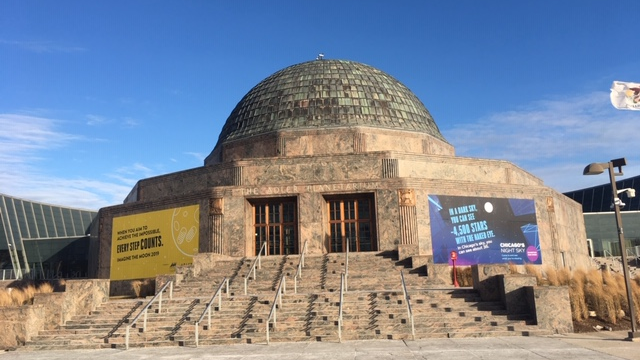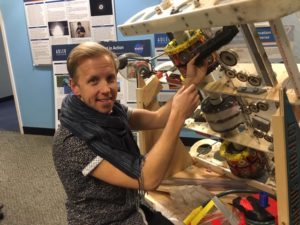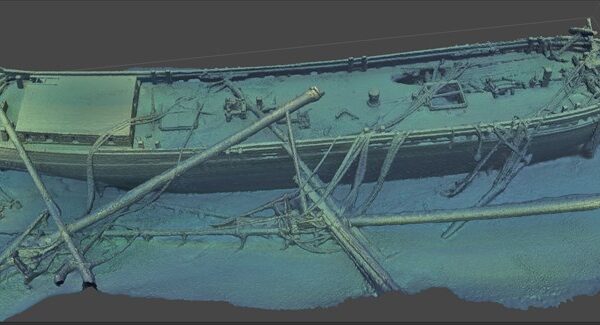
Shortly after a meteorite fireball landed in Lake Michigan off the Wisconsin shore in February 2017, astronomers at the Adler Planetarium in Chicago started brainstorming.
Could fragments of the meteorite be retrieved from the bottom of the lake using a robotic device, the scientists wondered?

Chris Bresky explaining Starfall, Photo by Gary Wilson
Chris Bresky’s mind started brainstorming too. If a project to retrieve the fragment was launched, could his students be a part of it? Bresky is the manager of the teen program at the planetarium.
A self-described storyteller, Bresky saw the project as tailor-made for his students. What better story is there than “alien from outer space landing in your backyard” to compel teens to engage in science, even if they hadn’t previously been interested, Bresky told Great Lakes Now.
A team was formed. Experts from neighboring Shedd Aquarium and the Field Museum hopped on board, and NASA lent its expertise to what had been named, The Aquarius Project.
Great Lakes Now recently talked with Bresky about the project. The interview was recorded, transcribed and edited for clarity.
Great Lakes Now: To retrieve meteorite fragments from the depths of Lake Michigan is a daunting project. Why was it important for Adler to take it on?
Chris Bresky: The Adler Planetarium is all about uniting all of us under one sky and sometimes that sky can seem far away. Space can seem distant and unrelated to a person, especially teens that I serve.
My background is in the arts and storytelling, and this was a great story. I have found that exciting stories compel teens to engage. Even those who might not even be excited about science. When you have a story that’s basically an alien from outer space landing in your backyard, it doesn’t take much more than that to light up someone’s imagination.
GLN: Even if your backyard is Lake Michigan?
CB: Even if your backyard is Lake Michigan, especially if your backyard is Lake Michigan. Because then you have the mystery of space meeting the mystery of the deep. You have “Twenty Thousand Leagues Under the Sea” meets “2001 Space Odyssey.”
GLN: Talk about the involvement of the students who participated in the search. Did they have to be coaxed or were they all in from the beginning?
CB: No, these students didn’t have to be coaxed. The story was compelling enough, real and authentic, so the students felt appreciated and that their contributions mattered. That’s pretty important.
When they realized that no one had done anything like this before and they were literally writing the book, it was easy for them to stay engaged and feel they had an important role in the project.
GLN: The American Meteor Society praised the project but said any meteorites yet to be recovered would have little scientific value. Does it make sense to continue the project?
CB: Absolutely. The majority of the Earth is covered in water and yet there is no tried and true method of underwater meteorite recovery and these students are writing the book on it.
I believe the groundwork has been laid and, though for the Adler Planetarium the future of the Aquarius Project is unknown, science is a journey and I hope this journey continues.
GLN: The project received an innovation award in Chicago for collaboration. How did that come about?
CB: The Chicago Innovation Award was a humbling one for the Adler. We’d been nominated in the past but we haven’t received one.
Receiving an award was a wonderful recognition for the Adler. The Adler was the first planetarium in the country and in the Northern Hemisphere, so it was an innovator from the jump. It was exciting to be part of this project that lived up to that spirit of innovation.
The students were thrilled and the staff was happy to be recognized by the city of Chicago.
GLN: If new meteorite fragments hit Lake Michigan a few miles east of the planetarium, would you do this project again?
CB: Absolutely. I think what these students are doing is unprecedented and like with any scientific endeavors, say going to the moon, there were many different steps to it. There was the Mercury program, the Gemini program and finally Apollo. This underwater meteorite retrieval attempt is brand new scientific ground.
No, I don’t think we’ve answered all the questions in our first go. I think it would be unfair to say that science is that easy. If a meteorite landed tomorrow, I think we would totally jump on board and have a lot more questions answered than we did to begin with.
Featured Image: Adler Planetarium in Chicago IL, Photo by Gary Wilson




